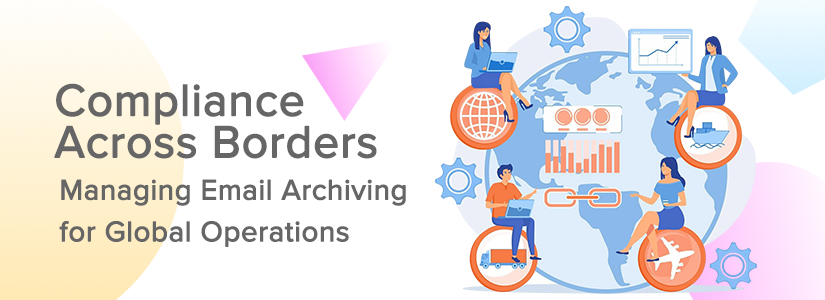Compliance Across Borders: Managing Email Archiving for Global Operations

In 2023, a popular global tech company was fined over $20 million for violating the EU’s General Data Protection Regulation (GDPR).
Their mistake?
Storing European customer emails on U.S. servers without obtaining consent or implementing proper safeguards. This incident wasn’t just an unfortunate oversight but a costly lesson in the importance of compliant email archiving.
As data privacy regulations worldwide tighten, businesses must reassess how they store and manage email data. Global regulations, including the GDPR, CCPA, PIPEDA, LGPD, and Australia’s Privacy Act, add substantial complexity to cross-border compliance. Non-compliance doesn’t just risk fines but threatens reputational damage, legal battles, and data exposure.
Here’s a quick overview of what will be covered in this blog:
- Dive into the global legal landscape of email archiving
- Explore the role of data sovereignty
- Discuss how to align retention policies with local laws
- Examine how email archiving providers can support multi-jurisdictional compliance
The Global Legal Landscape for Email Archiving
What Is Email Archiving?
Email archiving is the process by which an organization stores business emails within a secure, centralized repository known as an email archiver or email archiving platform.
Most email archivers automatically capture and make a copy of all incoming and outgoing messages, indexing and saving those copies to a secure data store where they are preserved in their original format.
Why It Matters?
Email is considered the primary communication tool for most organizations. It is a common focal point in compliance audits, given that it contains contracts, internal decisions, and customer data. Regulators expect organizations to preserve and produce email records on demand.
Failure to properly manage email records can lead to legal penalties, reputational damage, and loss of customer trust. Implementing a robust email archiving solution helps organizations meet regulatory requirements and ensures quick, reliable access to critical information.
Key Terms that will be discussed in this blog:
- Data Sovereignty: The concept that digital information is subject to the laws of the country where it originates or is stored.
- Retention Policies: Organizational rules for how long data is retained and when it should be deleted.
- Multi-Jurisdictional Compliance: The requirement to comply with overlapping or conflicting regulations across different legal jurisdictions.
Data Sovereignty: Challenges and Solutions
Data sovereignty – data must be governed according to the laws of the country in which it is created or processed. This poses substantial challenges for multinational organizations that rely on cloud services operating across multiple jurisdictions
Key Challenges
- Conflicting Laws: The GDPR prohibits unauthorized international data transfers, while the U.S. CLOUD Act permits the U.S. government to access data held by American companies, even if the data is stored overseas. This legal tension creates uncertainty for organizations trying to comply with both jurisdictions simultaneously, increasing the risk of non-compliance.
- Cloud Storage Across Borders: Global cloud providers often store data in multiple regions, resulting in limited visibility and control over the physical storage location of email data. As a result, organizations face challenges in enforcing data residency policies and meeting regulatory requirements across different countries.
- Localization Demands: Countries including Russia, China, and India are pushing for stricter data localization, requiring personal data to remain within national borders. This development prompts organizations to rethink their cloud strategies and invest in region-specific infrastructure to maintain compliance.
Practical Solutions
- Geo-Fencing and Regional Data Centers: Use tools and providers that allow geographic separation of data by region.
- In-Region Storage Options: Opt for archiving solutions that provide data storage facilities located in the specific regions where your business operates.
- Data Residency Controls: Implement policies and tools that prevent data from crossing borders without legal clearance.
By working with a provider that offers flexible data residency options, you can meet legal obligations while maintaining operational efficiency. This also mitigates risks associated with data sovereignty and ensures greater control over where sensitive information is stored.
Aligning Retention Policies with Local Data Laws
Why It’s Crucial
Data retention requirements vary by country and, in some cases, by industry, dictating how long information must be kept and when it should be deleted.
Inconsistent retention policies can put organizations at risk of:
- Premature deletion – losing vital records
- Excessive retention – violating privacy laws
Examining regulatory frameworks such as the EU’s GDPR data minimization principles with retention requirements in other countries offers essential guidance for shaping effective data management policies.
Real-World Examples:
- European Union – GDPR mandates that organizations only store personal data for as long as necessary, supporting data minimization and purpose limitation. This ensures that companies limit exposure to data breaches and respect individuals’ privacy rights.
- United States – Regulations such as HIPAA (healthcare), FINRA (finance), and SEC Rule 17a-4 require data retention for 5–7 years or longer. These rules maintain transparency, accountability, and protect sensitive information across various industries.
- Canada & Australia – Emphasize user access rights, secure data disposal, and proof of compliance. Organizations adhering to these requirements aid in avoiding penalties and build trust with customers.
Best Practice Tips
- Conduct Policy Audits: Review your current retention schedules against local laws & industry regulations.
- Segment Retention by Region: Use tools to apply unique retention rules per country, region, or department.
- Educate Compliance Officers: Keep teams informed about ongoing legal changes and adjust to policies accordingly.
Effectively aligning retention policies with local regulations reduces legal risks and strengthens an organization’s overall data governance framework. Staying adaptable in managing retention ensures compliance while safeguarding valuable information.
Multi-Jurisdictional Compliance Support from Email Archiving Providers
When evaluating providers, consider the following:
- Framework Support: Do they comply with GDPR, CCPA, LGPD (Brazil), PIPEDA (Canada), and other regional laws?
- Granular Policy Controls: Can you create unique rules for each country or business unit?
- Audit and Legal Hold Features: Do they offer built-in audit trails, export capabilities, and eDiscovery tools?
Why It Matters
Staying compliant with global regulations aids organizations in significantly reducing legal risks. Non-compliance can lead to ample fines, legal action, or even operational disruptions. A robust email archiving solution ensures that data retention, deletion, and access align with regulatory expectations in every jurisdiction you operate in.
Additionally, effective archiving tools enable fast, secure cross-border eDiscovery, allowing users to locate and export relevant communications without breaching data sovereignty rules. Furthermore, built-in audit trails, access logs, and export capabilities simplify compliance audits, offering clear evidence of policy adherence.
Key Takeaways
Managing email archiving across borders is challenging yet achievable with the right strategy.
- Respect Regional Differences: One policy doesn’t fit all. Adjust settings by geography.
- Email archiving is essential for compliance, security, and preserving critical business records.
- Global regulations like GDPR, CCPA, LGPD, and PIPEDA introduce greater challenges for achieving email compliance.
- Data sovereignty laws require organizations to store and manage data according to local legal frameworks.
- Conflicting international laws (e.g., GDPR vs. U.S. CLOUD Act) create compliance challenges.
- Cloud storage across regions can limit visibility and control over where data is physically stored.
- Countries including Russia, China, and India are enforcing strict data localization requirements.
- Inconsistent retention policies risk legal penalties from either deleting too early or retaining data too long.
- Aligning policies with local regulations improves governance and reduces compliance risks.
- Best practices include regular audits, region-specific retention settings, and compliance officer training.
How Can Intradyn Help?
Intradyn’s email archiving solution is built with global compliance in mind, offering geo-specific storage, retention controls, and robust audit capabilities. Whether you’re navigating GDPR, CCPA, or data localization laws, Intradyn helps you meet complex regulatory requirements with ease. With Intradyn, staying ahead of evolving global standards becomes simpler and more scalable.
Let Intradyn help you navigate compliance challenges across every region. See How It Works
Final Thoughts
Cross-border data compliance is no longer just about avoiding fines, it’s about safeguarding your business, maintaining customer trust, and preserving your reputation in a tightly regulated world. As global laws become more complex and enforcement becomes more aggressive, organizations must ensure their email archiving strategies are adaptable, transparent, and aligned with regional requirements.
In this evolving legal environment, scalable and compliant email archiving has become a strategic imperative. Companies that take a proactive approach today will be better equipped to navigate future regulations and remain resilient in the face of change.

